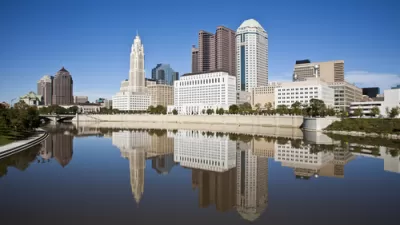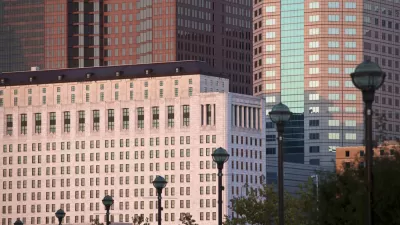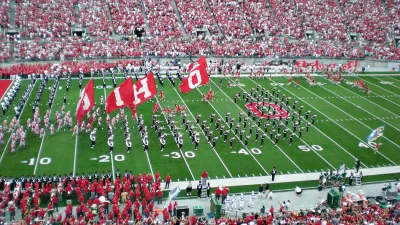The "Smart Cities Challenge" paid Columbus, Ohio $50 million to kick start a revolution of urban technology. The revolution never arrived, according to a recent assessment by Wired writer Aarian Marshall.

An article by Aarian Marshall evaluates the results of the $50 million grant awarded the city of Columbus, Ohio for the U.S. Department of Transportation's "Smart Cities Challenge" in 2016. Both the competition and Columbus' victory were huge urbanism and planning stories at the time—and the grant program was intended to achieve a game-changing legacy for the Obama administration. But after setting aside those aspirations, Marshall's assessment does not find much progress to report as a result of the competition.
Among the plans included in the winning grant proposal from the city of Columbus were "Wi-Fi-enabled kiosks to help residents plan trips, apps to pay bus and ride-hail fares and find parking spots, autonomous shuttles, and sensor-connected trucks," explains Marshall. Columbus also promised to deliver all of these new technologies in locations that provided access to underserved communities.
Here's how Marshall sums up the fruits of five years and $50 million in Columbus:
According to the project’s final report, issued this month by the city’s Smart Columbus Program, the pandemic hit just as some projects were getting off the ground. Six kiosks placed around the city were used to plan just eight trips between July 2020 and March 2021. The company EasyMile launched autonomous shuttles in February 2020, carrying passengers at an average speed of 4 miles per hour. Fifteen days later, a sudden brake sent a rider to the hospital, pausing service. The truck project was canceled. Only 1,100 people downloaded an app, called Pivot, to plan and reserve trips on ride-hail vehicles, shared bikes and scooters, and public transit.
As for the consequences of the failed "Smart Cities Challenge" experiment, Marshall warns of relying on technology as a silver bullet solution for all urban challenges, and also notes that some tech advancements that once seemed full of promise, don't seem quite as shiny. The same sentiment was echoed by a statement from Elon Musk the same week as Marshall's article declaring self-driving cars and autonomous vehicle technology a "hard problem" to solve.
For more background on the Smart Columbus Program and the Smart Cities Challenges see Planetizen tags for both.
FULL STORY: America’s ‘Smart City’ Didn’t Get Much Smartercolumbu

Planetizen Federal Action Tracker
A weekly monitor of how Trump’s orders and actions are impacting planners and planning in America.

Map: Where Senate Republicans Want to Sell Your Public Lands
For public land advocates, the Senate Republicans’ proposal to sell millions of acres of public land in the West is “the biggest fight of their careers.”

Restaurant Patios Were a Pandemic Win — Why Were They so Hard to Keep?
Social distancing requirements and changes in travel patterns prompted cities to pilot new uses for street and sidewalk space. Then it got complicated.

Platform Pilsner: Vancouver Transit Agency Releases... a Beer?
TransLink will receive a portion of every sale of the four-pack.

Toronto Weighs Cheaper Transit, Parking Hikes for Major Events
Special event rates would take effect during large festivals, sports games and concerts to ‘discourage driving, manage congestion and free up space for transit.”

Berlin to Consider Car-Free Zone Larger Than Manhattan
The area bound by the 22-mile Ringbahn would still allow 12 uses of a private automobile per year per person, and several other exemptions.
Urban Design for Planners 1: Software Tools
This six-course series explores essential urban design concepts using open source software and equips planners with the tools they need to participate fully in the urban design process.
Planning for Universal Design
Learn the tools for implementing Universal Design in planning regulations.
Heyer Gruel & Associates PA
JM Goldson LLC
Custer County Colorado
City of Camden Redevelopment Agency
City of Astoria
Transportation Research & Education Center (TREC) at Portland State University
Camden Redevelopment Agency
City of Claremont
Municipality of Princeton (NJ)





























